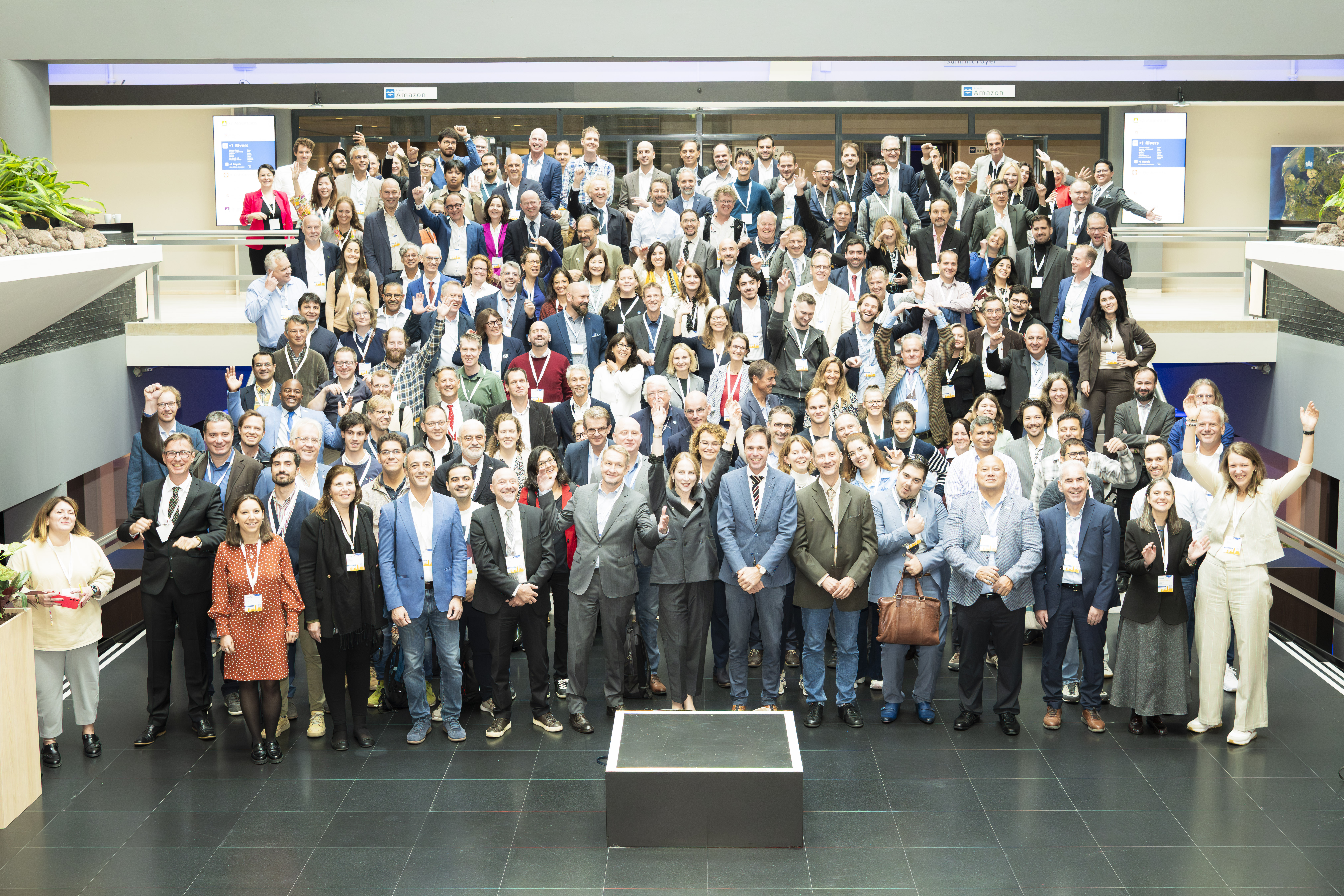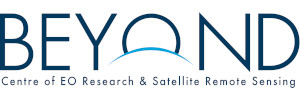
The Hague, 13–15 October 2025 — The EuroGEO Workshop 2025 convened the European Earth Observation (EO) community for three days of high-level exchanges, innovation, and collaboration at the World Forum in The Hague. Co-organised by the European Commission, the EuroGEO Secretariat, and the Netherlands Space Office under the EuroGEOSec Project, the workshop featured 38 sessions, over 200 speakers, and an audience of more than 300 participants from research institutions, space agencies, Copernicus services, EU projects, ministries, and the private sector. This year’s edition focused on accelerating the delivery of Earth Intelligence in Europe, aligning research, policy, and market priorities with global GEO objectives, and shaping a shared vision for EuroGEO’s next phase under the #OneEuroGEO initiative.
BEYOND/NOA, as a partner of the EuroGEOSec Project, contributed its expertise to several key thematic sessions of the Workshop, in addition to supporting the communication and organisational aspects of this important event.
Highlighting Regional Engagement and Innovation
On the first day, Alexia Tsouni, BEYOND/NOA Research Associate co-moderated with Valentin Thibault, European Commission, DG INTPA the Regional Engagement session, discussing international partnerships, sustainable development, and digital and green innovation across Sub-Saharan Africa, Latin America, the Caribbean, and Asia-Pacific. Haris Kontoes, Research Director of the National Observatory of Athens, contributed insights on Earth Observation capacity building and regional coordination for Earth Intelligence for All.
On Day 2 Haris Kontoes (NOA) with Lefteris Mamais (Evenflow), Mark Dowell (European Commission’s Joint Research Center -JRC) and Michel Rixen (European Commission, DG DEFIS) explored in a panel discussion, how research and innovation can serve as key drivers in scaling up the uptake of Earth observation (EO) across sectors – from climate services and agriculture to urban planning and emergency response. By examining the persistent gap between promising pilot projects and their transition to operational, market-ready services, Haris highlighted successful and innovative services in the wildfire management and health sector, underscoring the importance of the triptych integration, synergy and exportation into bigger markets. In his summary and closing remarks he highlighted the EuroGEO Action Groups achievements with special mention to the expert studies results funded by JRC, the consolidation and establishment of the EuroGEO Secretariat, the GEO flagships initiatives, as well as the e-shape pilots' legacy in advancing integrated solutions with and for users.
All speakers introduced core themes such as the role of enabling technologies; mechanisms for empowering practitioners and co-designing EO solutions; data access and governance; etc. The session managed to explain how these conversations align with and inform the EuroGEO Implementation Plan, ensuring that Europe's EO ecosystem continues to deliver on key policy priorities, including the Green Deal, digital transformation, and resilience strategies.
See the panel’s discussion here
EuroGEO Action Group Contributions
Biodiversity, Ecosystems and Geodiversity
During the Biodiversity, Ecosystems and Geodiversity Action Group session, Dr. Spyros Theodoridis, BEYOND/NOA Research Associate, highlighted the current needs and gaps in existing Earth Observation (EO) products for monitoring biodiversity and protected ecosystems. He presented the potential of Copernicus Land Monitoring Service (CLMS) vegetation indicators in capturing habitat transformation at the global scale and emphasized the importance of incorporating ecological information into these indicators. Using a case study from the Greek mountain grasslands, he demonstrated how remotely-sensed vegetation trend indicators can effectively capture biodiversity loss in these fragile ecosystems. He concluded by suggesting pathways for improving the use of EO data to assess and predict biodiversity responses to global environmental change and climate-related disasters.
Green Deal Data Space
During the Green Deal Data Space Action Group session, Spyros represented the Biodiversity, Ecosystems and Geodiversity Action Group to illustrate the data flow needs within the biodiversity domain. He emphasized the urgency of developing efficient and interoperable biodiversity data spaces capable of supporting the objectives of the European Green Deal, and in particular, the EU Biodiversity Strategy for 2030, which aims to advance the transition toward a sustainable and climate-neutral economy. He reviewed the key indicators required for corporate biodiversity disclosure, identified critical reporting gaps in the biodiversity business landscape, and proposed mechanisms through which the Green Deal Data Space could address these challenges. Drawing on his published research, he presented a use case demonstrating how the Green Deal Data Space Action Group can effectively support the data needs of small, medium, and large EU enterprises in the healthcare and herbal medicine sectors, by integrating diverse data sources such as GBIF, IUCN, the European Medicines Agency, and Copernicus.
Disaster Resilience and Health
Haris Kontoes, Coordinator of the EuroGEO Action Group Disaster Resilience and Health led the Disaster Resilience and Health session focused on EO downstream priorities in disaster resilience and health, providing recommendations that feed directly into the EuroGEO Implementation Plan. This session managed to brought together the members of the EuroGEO Action Group Disaster Resilience and Health to discuss the key R&I priorities for the downstream EO sector within the Action Group's domain, including interesting discussions on the evolution of Copernicus Services.
The session featured insightful presentations from BEYOND/NOA Research Associates Alexia Tsouni and Mariza Kaskara, showcasing BEYOND’s active involvement across EuroGEO Action Groups. In particular, Alexia Tsouni presented the activities and progress of the Disaster Resilience Action Group, highlighting ongoing efforts to enhance disaster preparedness and response through Earth Observation and data-driven innovation. Mariza Kaskara focused on the Health Action Group, outlining how EO-based services and analytics contribute to understanding environmental impacts on public health and supporting evidence-based policy and action.
Energy Action Group
During the Energy Action Group session, Rizos-Theodoros Chadoulis, BEYOND/NOA Research Associate in the energy sector presented the DRE and E-DREAM projects, which advance renewable energy forecasting and climate resilience across Europe and the Mediterranean. He outlined the policy framework of the European Green Deal, Fit for 55, and the Paris Agreement, emphasizing the Mediterranean as a climate hotspot. DRE, under the DestinE initiative, develops a digital twin of solar and wind systems using satellite data, simulations, and AI-based forecasting. E-DREAM leverages Copernicus datasets and climate projections to assess resource variability and support resilient energy planning. Rizos concluded that both projects aim to turn scientific knowledge into actionable insights for a sustainable and climate-resilient energy future.
As the coordinating partner of the EuroGEO Action Groups, BEYOND/NOA organised a dedicated poster area highlighting the work and achievements of the Action Groups.
See the posters here per Action Group
Communication at the Heart of EuroGEO
Aspasia Trevlaki, Communication and Dissemination Specialist at BEYOND/NOA and Communication Manager of the EuroGEOSec project, chaired a parallel session on strategic communication, emphasizing EuroGEO’s role in uniting and building a vibrant, inclusive and collaborative EO ecosystem, amplifying the societal impact of Earth Observation. The session’s presentations highlighted how effective communication can build trust, foster collaboration, and translate complex EO data into actionable insights.
Presentations:
-Aspasia Trevlaki, Head of EuroGEO Communication, National Observatory of Athens
-Marina Guillen, Policy Officer, European Commission, DG RTD
-Jasper Wamsteker, Head of Communication and Education, Netherlands Space Office (NSO)
-Alexandre Brecher, Action Creative Content Lead, iClimateAction Project
-Hans van Leeuwen, Scientific & Strategic Project Leader, PCP-WISE project
-Alan Mandrillon, Space Projects Manager, SPACE4Cities & VALORADA projects
Aspasia illustrated how the EuroGEO communication strategy embodies the principles of the 3Cs — Combine, Coordinate, Cooperate — bridging disciplines, connecting initiatives, and amplifying Europe’s EO voice. She presented EuroGEO’s growing communication ecosystem, featuring over 40 success stories, an active newsletter community, and impactful audiovisual storytelling that brings science closer to citizens. Her concluding message reinforced the importance of moving from individual messages to a shared EuroGEO story, activating the Action Groups as ambassadors, and turning communication into collective intelligence — transforming coordination into collaboration, and collaboration into lasting impact through an established network of European project communicators, ensuring consistent reporting on EuroGEO and, subsequently, formulating the European communication contribution to GEO.
Useful Links
- See the presentations here
- Enjoy the photo section here
- Explore the EuroGEO Workshop 2025 report here
- More on the EuroGEO Workshop 2025 here https://eurogeosec.eu/egw2025/
